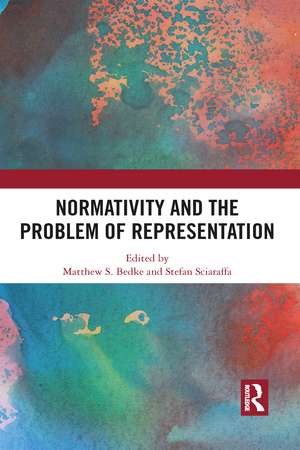Normativity and the Problem of Representation
Editat de Matthew S. Bedke, Stefan Sciaraffaen Limba Engleză Paperback – 30 iun 2021
Claims about what we ought to do, what is best, what is justified, or simply what counts as a good reason for action—in other words, evaluative or normative claims—are familiar. But when we pause to ask what these claims mean and what we are doing when we use them, puzzles arise. Are there facts of the matter about what ought to be done, much like there are facts of the matter about mathematics or the natural world? If so, "ought claims" are probably trying to represent the "ought facts". Alternatively, perhaps there are no evaluative facts, in which case evaluative claims are either trying to represent facts which do not exist, or evaluative claims are not in the representation business to begin with. The latter option is intriguing, and it is the subject of much recent work in expressivism, pragmatism, and semantic relativism. But if ought claims are not representing anything as factual, why do we think such claims are true or false, and what are we doing when we disagree with one another about them? This book sheds light on this important area of philosophy.
This book was originally published as a special issue of the Canadian Journal of Philosophy.
Preț: 391.40 lei
Nou
Puncte Express: 587
Preț estimativ în valută:
74.91€ • 77.100$ • 63.30£
74.91€ • 77.100$ • 63.30£
Carte tipărită la comandă
Livrare economică 10-24 martie
Preluare comenzi: 021 569.72.76
Specificații
ISBN-13: 9781032091266
ISBN-10: 1032091266
Pagini: 340
Dimensiuni: 156 x 234 x 18 mm
Greutate: 0.49 kg
Ediția:1
Editura: Taylor & Francis
Colecția Routledge
Locul publicării:Oxford, United Kingdom
ISBN-10: 1032091266
Pagini: 340
Dimensiuni: 156 x 234 x 18 mm
Greutate: 0.49 kg
Ediția:1
Editura: Taylor & Francis
Colecția Routledge
Locul publicării:Oxford, United Kingdom
Public țintă
Postgraduate and UndergraduateCuprins
1. Gripped by authority 2. Expressivism, meaning, and all that 3. Relativism and the expressivist bifurcation 4. Perspectival representation and fallacies in metaethics 5. Two nondescriptivist views of normative and evaluative statements 6. The unity of moral attitudes: recipe semantics and credal exaptation 7. Neo-pragmatism, morality, and the specification problem 8. Building bridges with words: an inferential account of ethical univocity 9. Keeping track of what’s right 10. Solving the problem of creeping minimalism 11. The real and the quasi-real: problems of distinction 12. Representing ethical reality: a guide for worldly non-naturalists 13. A semantic challenge to non-realist cognitivism 14. Moral supervenience 15. Why conceptual competence won’t help the non-naturalist epistemologist
Notă biografică
Matthew S. Bedke is a Professor of Philosophy at the University of British Columbia, Canada. He specializes in meta-ethics and meta-normativity and his work addresses topics such as the nature and psychology of normativity, debunking arguments in ethics, and motivational internalism.
Stefan Sciaraffa is an Associate Professor of Philosophy at McMaster University, Canada. He specializes in political philosophy, the philosophy of law, and metaethics. His work addresses the institutional structures, attitudes, behaviours, practical reasoning, and discourse that constitute relationships of political community.
Stefan Sciaraffa is an Associate Professor of Philosophy at McMaster University, Canada. He specializes in political philosophy, the philosophy of law, and metaethics. His work addresses the institutional structures, attitudes, behaviours, practical reasoning, and discourse that constitute relationships of political community.
Descriere
This book tackles questions which revolve around the representational purport (or lack thereof) of evaluative and normative claims. This book was originally published as a special issue of the Canadian Journal of Philosophy.
